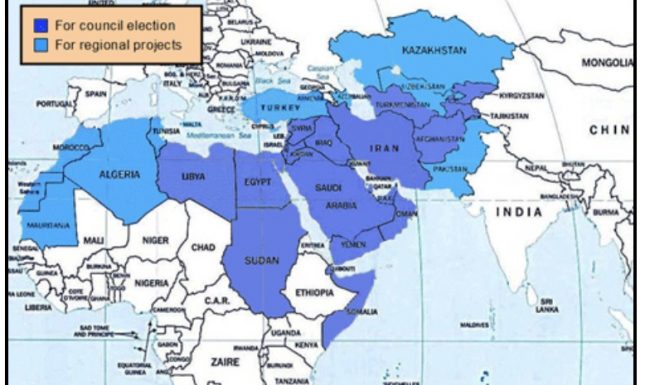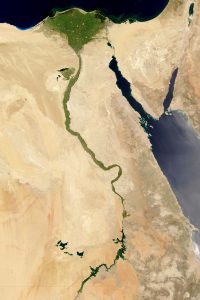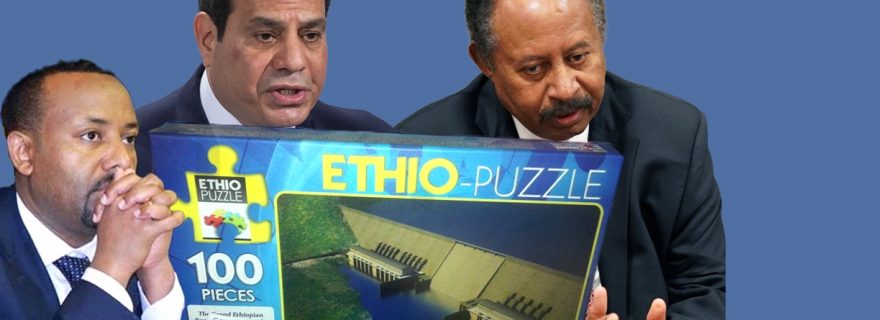The Nile: Between Arab and African Geopolitics
The Ethiopian mega dam on the Nile raises not only hydro-technical disagreement between Egypt and Sudan (downstream countries) and Ethiopia (the source of the Blue Nile); it also underscores latent contested perceptions of Arabs versus Africans. However, the Nile flow transcends this division.
On 19 June, 2020, upon the request of the Egyptian government, the UN put the dispute between Egypt and Ethiopia over the Grand Ethiopian Renaissance Dam (GERD) on its the Security Council agenda, after the negotiations had stalled several times. The three countries of the Eastern Nile Basin (Egypt, Sudan, and Ethiopia) failed to reach an agreement on filling and operating the largest hydropower dam in the African continent. The Ethiopian government opposed this Egyptian step, arguing the Security Council should not intervene, as this would violate state sovereignty. Additionally, the Ethiopian government reframed the GERD dispute as an African problem that should be discussed and solved by African organizations first. Accordingly, the African Union (AU), with the South African president as the current chairperson, took the lead and have been facilitating the negotiations, which until writing this piece have not reached a concluding agreement!
The role of regional intergovernmental organizations is to manage national interests among its member states through collaborative tools, driven by the norms of integration and peace. Therefore, the Ethiopian request to involve the AU is understandable. However, the Arab League (AL) is a regional organization as well, of which Egypt and Sudan are members. The Arab Council for Foreign Ministers of the AL released a statement saying that the water security of Egypt is an integral part of the Arab water security. They supported the Egyptian position of rejecting the filling of the reservoir before concluding an agreement. The Arab statement was not welcomed by the Ethiopian government, instead, it was framed as “blind support” to Egypt, going against Ethiopian water rights. Of course, all the Nile Basin countries are represented in the AU and not in the AL. However, this confrontation raised an important question: To what extent can regional organizations collaborate and harmonize their interests, particularly when membership overlaps across regions.


Historically, Pan-Africanism and Pan-Arabism evolved as collective movements and ideologies against colonial powers: The European colonizers and Ottoman empire. Throughout the twentieth century until today, the two ideologies have been challenged by various regional disputes and issues, resulting in diversion from the ultimate objective of integration and unity. In addition to these unsuccessful trajectories, the relation between Africans and Arabs is contentious. Some perceive the Arabs as having employed colonial practices in Africa, for example through their involvement in slave trade, mainly in the Horn of Africa. While other scholars advocate for interactions of solidarity between the Arabs and Africans. The GERD dispute has brought up the fraught relation between Arabs and Africans. Some voices on social media commented on the GERD dispute by arguing that Egypt is an Arab country that challenges Ethiopia, an African country that defeated the Italian colonizer and never colonized itself. Or they argue that the Egyptians do not want the African country to achieve economic and social development.


The Horn of Africa, where Ethiopia plays a significant role, is not detached from the Arab region or Middle East politics. Recently, the Gulf countries developed significant interest in Ethiopian politics. Saudi Arabia and the United Arab Emirates hosted peace talks between Ethiopia and Eritrea. Importantly, the Gulf countries have deployed wide agriculture investments in the Ethiopian fertile lands. Additionally, there are many Ethiopian migrants in the Gulf countries, who have been at the top of diaspora contributors in purchasing GERD bonds. The geopolitics of the Middle East and Horn of Africa show economic interactions that transcend the division of Africans versus Arabs.
The geographical proximity facilitates Ethiopian interactions with the Gulf countries at the centre of the Middle East region. Moreover, environmental determinism makes the Nile River a conductor between the African and Arab regions. Essentially, the Nile overruns the colonial division between North Africa and the Sub-Sahara. From the confluence of the White and Blue Nile at Khartoum onward, the river becomes the only fresh perennial water resource flowing into arid lands. That is why the aerial image of Egypt looks like the lotus flower where “all” Egyptians settled around the only river they have.

This environmental determinism of the Nile flow in the desert is behind the Egyptian position of defending her water shares as stated in historical treaties. In contrast, the upstream countries that had been colonized contest these treaties, as part of “coloniality” debate. Seemingly, the foreign policy of African countries adopts a discourse against colonial practices in interstate relations. But looking at the national agriculture and water polices, they have been designed according to a neoliberal structure, with capitalist powers behind land and water grabs in the Nile Basin.
The dispute over the GERD reveals the complex relations between the African and Arab regions. Moreover, it begs a revision of the consistency of anti-colonial ideals and post-colonial practices in managing water and agriculture sectors. Let’s think about de-colonizing the Nile River himself – as he is known in Egyptian, Ethiopian, and Sudanese cultures – and approaching him without ideological judgments and intentions of economic exploitation!



0 Comments